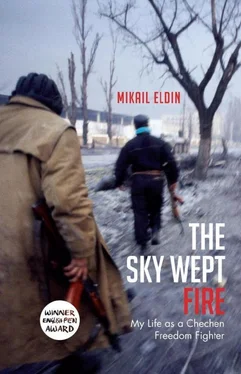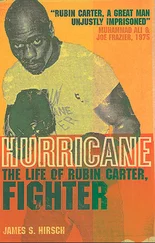The world’s best composers are Edvard Grieg and James Last. So different in style. They are the best because they have been granted that title here, by you, inside the flaming ring that encircles the besieged city. You already knew these composers before, and many others besides, but only now have you recognized them as the finest.
You were wandering as usual through the city’s ruins, filming after the latest bombardment. You saw a half-ruined house, an old building from the seventies. For the Chechens that is relatively old. After all, not a single Chechen house has stood for longer than fifty years. Ever since Civilized Russia arrived in the Wild Caucasus… The house is a good one. Clearly built with money earned by seasonal work in Kazakhstan, Siberia or central Russia. In Chechnya among those of a certain age you’d be hard-pressed to find anyone who hasn’t travelled for seasonal work at least once. In our beloved republic, despite enjoying vast natural resources, efficient agriculture with fine pasture for animal husbandry, and being industrially developed, unemployment among the indigenous population reached disastrous levels. The Chechens, no matter how highly qualified, could only dream of finding work, even a rank-and-file job, in many sectors in their home republic during the reign of the ‘most just and humane system on Earth’. Jobs in those sectors were available only to members of other ethnic groups living in Chechnya, first and foremost the Russians. And that was why the natives left each spring for the construction sites of Russia. They had to survive somehow.
Under the battered canopy are quite a few scattered cassettes. There’s a whole range of styles and genres of music. You grab the first two that come to hand: Edvard Grieg and James Last. You’re a bit peeved not to have found any more of your favourites. But never mind, you don’t get to pick and choose in war. You take both the cassettes with you. You could imagine the original owner putting on Grieg’s music and drifting into a deep reverie… This brilliant music cleanses his soul, making his thoughts purer. But that would be too trite. A tired old literary cliché. So you imagine nothing, just silently leave with the cassettes. Besides, in this strange, drawn-out war you’ve become something of an egotist. Or rather you were an egotist from the outset, along with all your fellow human beings, but until now you’ve managed to mask your personal ethics. In this place, though, such pleasantries are meaningless and your egotism shines through more clearly. There is somewhere for you to listen to the tapes: you have an old car, a Lada, with a young fighter at the wheel. The commander of the Almaz unit has seen to that. In this car you travel the city, filming its death on a video camera. You have naïve hopes of preserving at least some of this footage. You also drive to the firing positions in this car. It has a stereo with the usual selection of pop-music cassettes. But from now on you will listen to these composers and be carried away for a time into the mysterious, fantastical world of classical music. This music will accompany you on all your trips across the city. The sound of this mysterious music will remind you that you are vastly alone in this unjust world. And James Last’s ‘Lonely Shepherd’ will accentuate and deepen your loneliness and longing, seeking and finding an ally in you. The music of Edvard Grieg and James Last will ring out to the roar of guns, and the rumble of bombs, and the whirr of shrapnel. And it will stop ringing out on the snowy, blazing night when the abandoned car catches fire…
Tonight you are at the radio communications post. You often sit here, and you’ve witnessed many events from this post. You witnessed the entire battle of the Black Wolf unit against the attacking enemy forces. You heard how, with several men lost and nearly all of them wounded, including the unit’s commander – only three fighters were unharmed – they were forced to retreat slowly, fighting their way out in ferocious hand-to-hand combat. And nobody broke rank, not even the wounded. While the enemy, stunned by such obstinacy, did not dare push the assault further. The fighting went on the entire day. That day the enemy launched five assaults on Black Wolf’s positions. It was mainly the infantry delivering the attack, supported by artillery, mortar and tank fire. By evening, all that remained at the unit’s positions were half a dozen burning enemy tanks and infantry fighting vehicles and almost an entire company of dead enemy soldiers. Such battles were flaring up with astonishing frequency all around the city’s circular front line. And often they would end with the Russian Army denied even token success.
Today is one of those rare nights when, in the chill air, a disquieting lull freezes over the city like a black shroud. The city seems rapt in prayer, withdrawn into itself, like an ancient old man. In the sky around the city hangs a fiery necklace of illumination rounds, fired by the enemy who have come to kill it. Occasionally you hear long bursts of automatic gunfire in the distance: a sure sign of the clash of hostile reconnaissance teams, those aristocrats of war. It’s the lulls in combat you find difficult. You cannot get used to them. Lulls mean danger. And so you listen especially attentively to the night. The night is silent. Almost angelically peaceful… But you know this is just an illusion: the night is not peaceful at all. A night like this is particularly dangerous. It is like a boa constrictor, playing dead as it waits in ambush for its victim, only to spring to life at the right moment in a dappled, lethal strike. Only the radios, those remarkable surrogates for living people, attest with their crackle that this city, in which you’re listening to the night, is still alive. It is mauled, mortally wounded, but still alive. And it will stay alive for as long as its living defenders remain there. Motionless in the glacial darkness, the city reminds you of a lion, mighty king of the animals, mortally wounded yet still dangerous to the pack of hyenas encircling it with burning eyes, patiently waiting for its death.
The familiar call signs and the usual talk on the airwaves do not distract you from your contemplation. But suddenly you hear an unknown voice in the enemy tongue. It is a Russian radio operator who has hacked into your radio channel. You, too, often hack into their channel, so this is nothing unusual. The operator is making random calls to the defenders of the capital. One of them responds. The bored radio men fill the airwaves with insults and curses, threats and challenges to fight. The other militiamen, who are used to such scenes, do not react to the dialogue between the nervous comrade and the enemy radio operator. But as passions reach boiling point, you decide to intervene.
No – you don’t utter a word; you simply bring the live microphone of the radio set to the speaker, from which quietly flows the magical music of James Last. You could of course have given them Edvard Grieg, but you decided not to. You thought Grieg is better understood when listened to in solitude. The spirit of his music is too independent to be confined to a collective audience. And so you let them listen to the wonderful, sad music of James Last. The airwaves instantly fall quiet, with only the bewildered voice of the Russian radio operator softly saying, ‘Who’s that?’ You reply, ‘James Last, “The Lonely Shepherd”.’ You are perfectly aware that using the airwaves for music is categorically forbidden – radio communications have an altogether different function – but this is a special case.
The sad, enchanting music fills the airwaves, rising to the dark frosty sky like the doomed city’s final prayer. The city prays not for its own salvation: it prays for the salvation of the souls of those destroying it. And it knows that thousands of human souls, both destroyers and defenders, are praying alongside it. Each soul prays for something secret of its own. In this twilight silence, the city softly weeps tears of smoke, flowing straight to the sky, to God. It weeps for itself as it will never be again. Weeps for its inhabitants whom it will never see again. Weeps for its defenders, those who’ve fallen among the bones of the ruined buildings, and those still alive, still defending the city’s mournful shadow with a sacred tenacity. The city weeps for an island of love and life in a sea of hate and death. It knows, it senses, that it will drown in the sea of death and hate; it will choke under the terrible wave of cruelty. Left without its defenders, it will call to the Sky for a long time yet, in the thin voices of crying women and children led to their execution, the mute moans of dying old men, the infinite hatred and scorn for their executioners in the eyes of its gunned-down and tortured inhabitants. And the Sky in response will weep fire. Its fiery tears will fall on the remains of the city, burning up the last souls in the dying city. The Sky will wail with a bloodcurdling howl, like an outcast angel. Again and again the Sky will cast down fiery tears upon those who left without protecting the city to the end. To the last soul. The streets of the city, where once, long ago, happiness smiled, will now for a long time, for endlessly long, be colonized by horror, hate, fear and betrayal. For a long time Grozny will frighten the world with the appalling sight of its ghost.
Читать дальше












